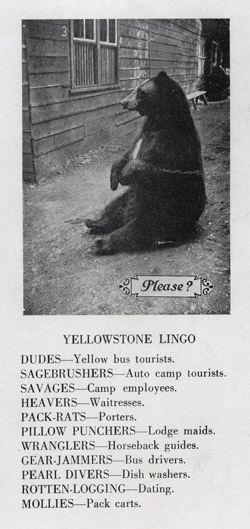Slang has been around for hundreds of years, starting with the English Criminal Cant in the 1500s and entering the popular imagination through its use in literature and drama. It wasn't until the 1920s, however, that slang began to throw off its association with criminals and the "lower-orders". Thanks to the booming entertainment industry of the 1920s, the youth-oriented flapper culture gained a glamorous image and young people around the country adopted such phrases as "cat's meow" and "the bee's knees" to indicate the best, wonderful, or ultimate. Later generations added "cool", "groovy", and "rad".
Yellowstone's jargon actually pre-dates the Yellowstone Park Company, although its exact origin is unknown. The earliest photograph album in the archives to use the language in captions dates to 1916, but it is clear from the writing that it was already a well accepted and known vocabulary for those in "the know." Beyond the general word "savages" used to describe all seasonal employees, each occupation had its own term: Heavers=Waitresses, Pack-Rats=Porters, Pillow Punchers=Lodge maids, Wranglers=Horseback guides, Gear-Jammers=Bus drivers, Bubble-Kings/Queens=laundry workers, and Pearl Divers=Dish washers. Terms for the visitors included "dudes" for those who took the full package tour by stagecoach or later by bus, while "sagebrushers" described those who camped. There was also a special term, "mollies" for the pack carts used in the camps. And no young person's slang would be complete without a term or two for romance; in this case "rotten-logging" was the word for dating or wooing.
The informal slang was made official in the late 1920s when the booklet "Songs of the Yellowstone Park Camps" was published by the Yellowstone Parks Camps Company and included the lingo on the back cover. It has since been publicized in numerous newspaper and magazine articles and even studied in academic journal articles. Most importantly, it is a way for current and former employees to build and sustain a sense of community even if they come from varied places and backgrounds and even if they spend only one memorable summer in Yellowstone.

Songs of Yellowstone Park Camps, Yellowstone Park Camps Company, circa 1929, Yellowstone Research Library.
"Slang" by Winona Bullard, et al (http://www.uncp.edu/home/canada/work/allam/1914-/language/slang.htm); Songs of Yellowstone Park Camps, by Yellowstone Park Camps Company, 1925-1930. Yellowstone Research Library.
